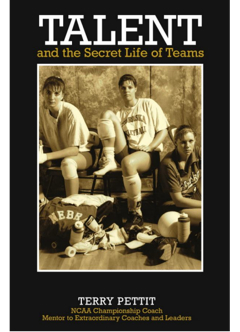Leadership, like coaching, is one of the most complex things that I know of. If we had a field guide to leadership it would contain thousands of decisions, some of them paradoxical and contradictory. Here are some I would include:
Leadership is being collaborative with your assistant coaches and giving them the opportunity to take complete responsibility for a specific area of the program.
Leadership is wooing and educating an administrator who can make a difference in your program, and who becomes emotionally engaged in your program’s development.
Leadership is waiting for tomorrow’s practice before you respond to a disappointing effort in tonight’s match.
Leadership is developing the coaches in your community.
Leadership is working backward from a goal.
Leadership is modeling the behavior you would like to see from players when they are under stress.
Leadership is asking yourself before you request a meeting with a player, “Am I doing this for her benefit or mine?” If it is the latter, you don’t need to meet.
Leadership is leveraging the strengths of your team and individual players rather than focusing on their weaknesses.
Leadership is letting go of ego when responding to disappointing losses or remarkable wins.
Leadership is recognizing the difference between talent and skill: what we can teach and what we can’t.
Leadership is creating an environment where learning is more likely to take place.
Leadership is changing behavior.
Leadership chooses purpose over goals when the two collide.
Leadership moves from directing to coaching to collaboration.
Leadership requires self-disclosure which is necessary to develop trust.
Leadership chooses to put itself in uncomfortable situations and to train its team to embrace being uncomfortable as they develop.
Leadership does not worship heroes, but trains and gives the opportunity for heroic behavior.
Leadership goes to Wal-Mart and asks, “What does the clerk do better than me?” Leadership watches a football game and notices that a defensive back shadows the opponent’s best receiver wherever he goes. Leadership asks, “What is the application to the libero?”
Leadership asks, “How do they train the turn at the end of the pool?” Leadership adapts. Leadership innovates.
Leadership tells stories. There was a girl who tried out as a walk-on for the volleyball team. She came from an area of the state where there are blue highways and no four-lane roads, where pelicans migrate to small sandhill ponds in the summer. The men wear hats or farm implement caps when driving, and they come into town for coffee.
She was pretty and had fast-twitch muscles, but her stature and the length of her arms meant she would have difficulty blocking. She was a good student and had an even better countenance. On a team of fourteen, she would never rise above eleven.
She was on the team for three years. A good practice player who rarely entered a game, she impacted the team G.P.A. more than matches. Once, when entering the coach’s office after her first year and asking what she could do to get better, an inexperienced head coach told her, “You have a better chance of flying across the street to the gymnasium than contributing to this team.” She laughed and went home, resolved to accomplish all the things the coach had questioned.
It would be nice if this story had a dramatic ending. Something like the player entering a match with the home team down in the fifth game of a regional championship, and she would go back beneath the balcony and unleash a string of unpassable serves that would send the opponent spinning into a time-out before the inevitable defeat. A rainbow of serves that meant that every minute of shagging balls, lifting weights, carrying equipment, playing roles, and wearing the numbers of opponents was worthwhile because of this special moment.
But that never happened. She never entered the game at a critical moment. She never had the opportunity to serve for the regional championship. Her shining moments came in practice when the “B” team plus an assistant coach would beat the first team in a wash drill. Sometimes the first assistant would pull her aside and whisper, “Great job today in practice.”
She graduated and earned a master’s degree in physical therapy. She married and had a daughter. Divorced. She was a success in business and continued to reinvent herself with bodybuilding first, then religion, then leadership and management. At every turn she kept in touch with her coach and her team. In this respect, she was like a hunting dog that goes into the wood to hunt but every now and then returns to make eye contact, to make sure you are still there.
What she may not know is how important these contacts were to the coach as well. (Does the dog greeting us at the door know that we would wag if we could?)
So what does this mean? Something happened that was good. Despite the head coach’s inexperience, despite the absence of a dramatic moment in a career spent on the “second” side of the net, she may have sensed that he cared about her development, or maybe we should allow for one of the most important ingredients in leadership, that for which we have no word other than, grace.


Be First to Comment